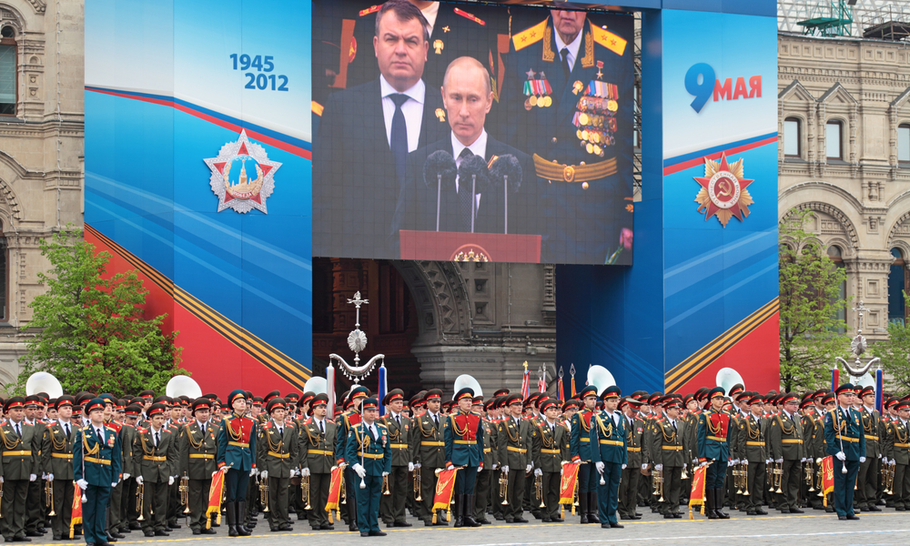Putin for ever?

Victory Day parade (Shutterstock)
Russia’s yearly state-of-the-union addresses tended to be quite stale affairs: the president’s overlong summary of the previous twelve months’ accomplishments, usually sprinkled with sleep-inducing economic statistics and moderately interesting indications on the direction of future policy. But last Wednesday’s iteration, delivered to an unsuspecting Russian parliament and public, was nothing less than a bombshell. It announced a raft of constitutional reforms, and was almost immediately followed by the resignation of the government.
Putin’s long-standing associate, Dmitry Medvedev, was unceremoniously replaced as Prime Minister by the former director of Russia’s Federal Tax Service, Mikhail Mishutsin, someone so unknown — and politically irrelevant — he did not even have a dedicated Wikipedia page to his name.
Putin’s long-suspected ambitions to break Stalin’s record as modern-day Russia’s longest-serving de-facto leader were, of course, never explicitly stated. Moscow is not Beijing, and, for all the power he has amassed over the previous two decades, Putin cannot quite follow Xi Jinping’s example in pushing for the outright removal of the constitutional limits prohibiting more than two consecutive terms in office.
A repeat of the previous exercise in political gamesmanship — when Putin circumvented that limit by temporarily switching to the Prime Minister’s office, between 2008 and 2012 — would also be a risky move. His return to the presidency prompted a wave of protests by Russian citizens angry at having been played.
Another scenario, suggested by some analysts, involved an effort at a full integration of the Russia-Belarus Union State, presumably led by a Putin now endowed with a kind of supra-national presidency. If there were such a plan at all, it foundered on Belarus’s unwillingness to compromise any further on its national sovereignty.
But Putin cannot afford to entirely relinquish power: for one, he would have to find a successor who would guarantee immunity for himself, and his entourage. Of course, he was himself anointed by Boris Yeltsin in 1999 for exactly this reason; but this was at a time when Russian politics was inherently unstable, and his predecessor had already been weakened (both politically and physically).
Apart from the fact that Putin still finds himself in rude health, a jockeying for position within the Russian elite at any hint of succession would likely prove far more visibly destabilising. Instead, it appears Putin will allow himself plenty of time and leeway in finding a fully empowered successor. Meanwhile, he will have to cling on to power beyond 2024 through some deft constitutional engineering, the broad outlines of which — camouflaging Putin’s ambitions behind the sheen of institutional reform — seem to be emerging.
Russia’s system has been dominated by a super-powerful presidency since 1993, when a “democratic” Boris Yeltsin pushed through the current constitution, having shelled his recalcitrant parliament into submission. This has served Putin rather well in the past 20 years. He has now concentrated power to the extent that the current legislature is little more than a rubber-stamping afterthought.
The current proposals will chip away at this all-powerful presidency, in favour of both houses of parliament — the State Duma and the Federation Council — and a hitherto informal advisory organ subservient to the presidency known as the State Council. Among others, a new president would more strictly be limited to two terms, regardless of whether they are served consecutively; (s)he would also lose the ability to appoint his or her government to the State Duma.
In a change quite possibly aimed at any overly ambitious jet-setting oligarchs, the president would also be barred from ever having held foreign citizenship or permanent residency overseas, and must have lived in Russia for 25 years (rather than the current ten). The State Council’s role in government would become formalised, and expanded.
These changes open several avenues for Putin to retain power. A switch to the Prime Minister’s office would seem the least probable of these avenues: apart from being a partial repeat of the 2008-12 scenario, it would also expose Putin to the low-politics tedium of — and responsibility for — the everyday management of the economy.
As the hapless Medvedev might attest, Prime Ministers have been rather convenient scapegoats for underperformance since Soviet — indeed, Tsarist — times, a fact that partially helps explain Putin’s ability to maintain his ratings in spite of recent economic trouble. The ruling political party’s consistent lack of popularity presents another problem in that regard: for this prime ministerial option to work, it would have to be remade into the central supporting pillar of Putin’s powerbase.
The Elder Statesman variant would appear to be much more viable. It was a role pioneered by China’s Deng Xiaoping, who did not hold the formal leadership of either the state or the Chinese Communist party in his time and has more recently been taken up by Kazakhstan’s Nursultan’s Nazarbayev. This would involve Putin pulling the required strings from a relatively safe position at the centre of de facto power.
Vladimir Putin will only be stepping sideways, rather than down, in 2024; he will likely remain Russia’s strongman for the foreseeable future. The dilution of power from the presidency will give him ample time to anoint a successor in the meantime. At least, that appears to be the plan; for Russia’s long-suffering opposition to thwart Putin will require much patience.




